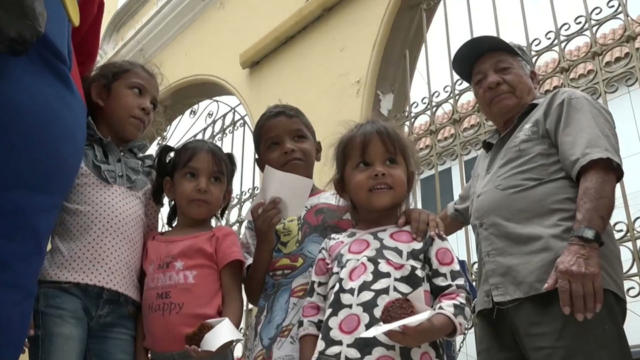Colombia, Ecuador and Peru are appealing for help in dealing with a flood of migrants from Venezuela. They’re asking other countries to help provide food and medical care for the new arrivals.
In Peru, officials say many of the migrants are sick and malnourished when they arrive. CGTN’s Dan Collyns reports on the impact they’re having on a city near the border with Ecuador.
More than a lunch it’s a lifeline. The church in the main square in Tumbes has always handed out free meals for the poor, but in the last few months, the lunch line has grown much longer, filled with Venezuelans fleeing food and medical shortages back home.
Cities on the Peruvian border are shouldering the burden of caring for the migrants. With donations from schools and churches, volunteers prepare a daily lunch for hundreds of Venezuelans, and for many, it’s the only meal they’ll eat all day. Most of the migrants are getting by as street vendors, like Karina Leon who sells homemade cocada- a sweet made from coconut.
“These lunches are a real help because it would cost around $2 to buy my lunch,” she said. “If I’m only earning $8 a day, then I’m left with only $6. That makes it hard to send any money home.”
And the last three months have seen increasing numbers of hungry children among the growing numbers of Venezuelans.
“We’re giving out more than 200 lunches each day,” said program coordinator Aniana Ho. “We began with 50 but in the last two weeks we’ve been handing out at least 150 lunches to satisfy the hunger of our fellow Venezuelans. A lot of them are passing through, but others are settling in the city. We know all of them are fleeing a humanitarian crisis.”
By and large, the people of this small border city have embraced the fleeing Venezuelans, but that help can’t continue on goodwill alone. Peru, along with Ecuador and Colombia, is calling for more international aid to cope with the migrant crisis. A health emergency has been declared here and officials says the flood of migrants has spread new cases of malaria and measles.
“We can’t prevent a person suffering from a disease from entering the country,” said Dr. Luis Suarez, Chief of Epidemiology for Peru’s Health Ministry. “We understand that this is part of the crisis Venezuela is going through and we’re trying to reduce the risk of diseases spreading, without interfering with people’s movement.”
On arrival in Peru, migrants get free medical attention and nurses check that children’s vaccinations are up to date. Cases of malnutrition and anemia are not uncommon in the youngest ones, but the chance to eat a free meal every day is, little by little, making a difference.
 CGTN America
CGTN America

